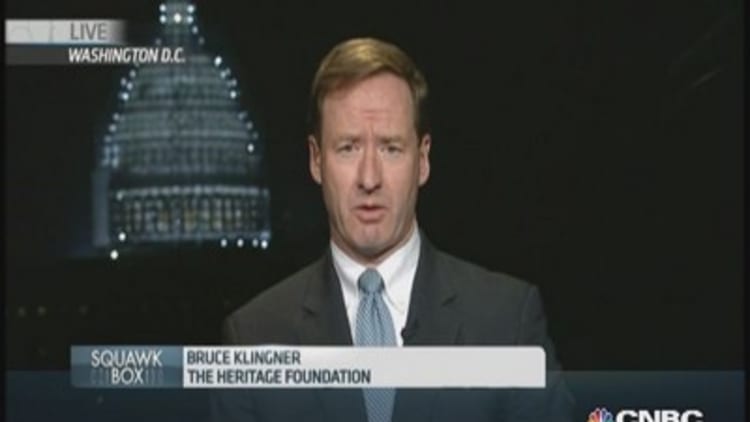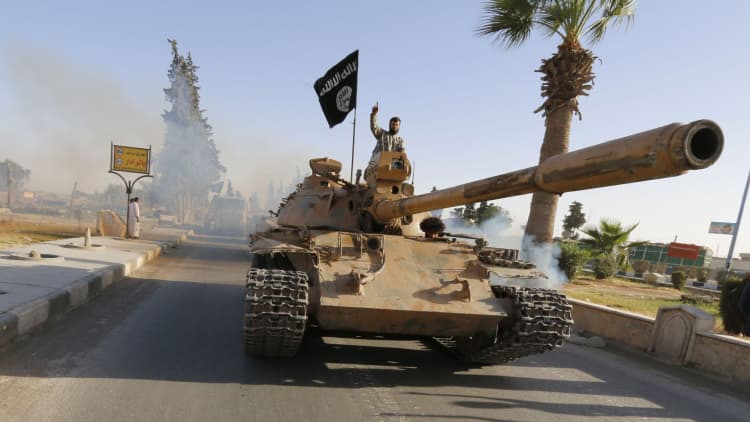As political turmoil gripped South Korea in 1948, with a Soviet-backed regime to the north plotting infiltration and invasion, the authoritarian leader Syngman Rhee pushed through a law giving himself sweeping powers to punish dissent and subversive activity.
Nearly 70 years and much political change later, the law not only remains in place but is set to become more draconian. New government proposals would make it easier for prosecutors to dissolve organisations accused of "anti-state" activities such as voicing support for the North.

South Korea is cracking down on dissent as governments across Asia are taking similar steps, to the alarm of activists, democrats and many citizens.
Tougher tactics are in evidence from Hong Kong, where tear gas was used to disperse pro-democracy protesters last September, to India, where non-governmental organizations are caught in the crosshairs. It is also an unwelcome reminder of much of the region's more authoritarian past.
Such is the case in South Korea, where critics of the law have dubbed it an embarrassing anachronism.
While heightened vigilance against communist propaganda might have been justified when North Korea's economy marched ahead of the South's in the 1950s and 1960s, the former's economic collapse and poor record on human rights mean only a tiny minority of South Koreans now view its system as desirable.

Yet this month, in an incident that brought veiled rebukes from the UN and US, an American citizen was deported under South Korea's national security law for making allegedly pro-North statements.
Read MoreWill Bank of Korea surprise with rate cut?
Prosecutions under the national security law have risen consistently under President Park Geun-hye and her fellow conservative predecessor Lee Myung-bak, from 32 in 2008 to 94 in 2013.
The highest-profile invocation of the law for years came last month, when a leftwing political party was disbanded at the instigation of Ms Park — the first such dissolution since 1958. The constitutional court ordered the break-up of the United Progressive Party on the grounds that some of its members had been recorded discussing sabotage of national infrastructure in the event of an inter-Korean conflict.
The judgment reflected the conservative argument that South Korea's extraordinary security situation — it remains technically at war with Pyongyang despite the 1953 armistice that ended the Korean war — necessitates a sterner stance towards subversive activity than is seen in most democracies. The national security law is "narrowly applied in exceptional cases that involve real threats to the security of the ROK and its democratic polity", says a spokeswoman for Ms Park.
But Lee Jae-hwa, a criminal lawyer who defended the UPP, believes the party's 100,000 members have been unfairly punished for the wrongdoing of a few. "The decision was not based on tangible evidence but on ideology," says Mr Lee. "The kind of party that doesn't think of North Korea as an enemy cannot be legitimate in South Korea."
More from the Financial Times:
Abbott rebuked for knighting Prince Philip
S Korean arrested over pro-North comments
Sewol shames ferry operator and politicians
Five lawmakers who represented the UPP are now taking legal action against the court's decision to expel them from parliament, arguing that it has no such authority.
"No matter how much you hate them, they were elected," says Kim Jiyoon, an analyst at the Asan Institute think-tank. But she notes that the ruling was broadly in line with public opinion, citing opinion polls that showed nearly two-thirds of South Koreans backed the decision.
"I don't think the government can get away with using [the national security law] however they want," Ms Kim adds, playing down parallels sometimes drawn by liberals with the authoritarian regimes that ruled until 1987.
However, the national security law is only one concern for those who fear freedom of expression is under threat. Unlike most developed nations, South Korea has a defamation law under which people can be criminally prosecuted, if a public interest cannot be demonstrated, for statements proved to be true.
Officials at the presidential office recently filed a criminal defamation complaint against the Segye Ilbo newspaper, which sparked a political scandal last month by quoting an internal government document. The document accused Chung Yoon-hoi — a former aide of President Park — of exerting inappropriate influence over the officials in question.
The plaintiffs argue that the document was fallacious and that the Segye Ilbo failed to make proper efforts to verify its content.
Critics say the officials are using heavy-handed tactics against the newspaper to cushion the impact of a scandal that sent Ms Park's approval rating to new lows.
Another lawsuit has cast a new shadow over South Korea's strained relations with Japan. A reporter for the Sankei Shimbun is on trial for reporting online rumours that Ms Park was secretly spending time with Mr Chung on the day the Sewol ferry sank last year with the loss of 304 lives. If convicted, the reporter could face up to seven years in prison.
Some analysts argue that complaints about freedom of expression are nothing new, noting previous cases such as the liberal president Roh Moo-hyun's 2003 decision to sue four right-leaning newspapers for libel.
Others such as Han Sang-hee, a professor at Konkuk University, argue that the situation has been deteriorating under Ms Park and her predecessor, pointing to the 2011 decision by Freedom House to downgrade the country to "partly free" in its widely followed global rankings on press freedom.
Such concerns are ill-founded, argues Ms Park's spokesperson. "The Korean government upholds and protects the freedom of expression in accordance with the constitution. Our constitution does not afford protection to defamation that is based on false information."

